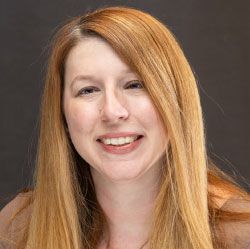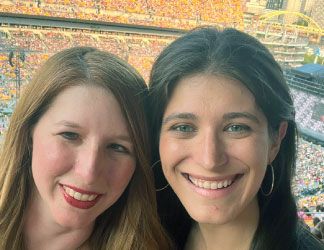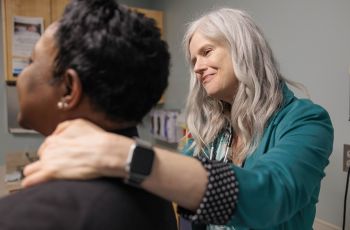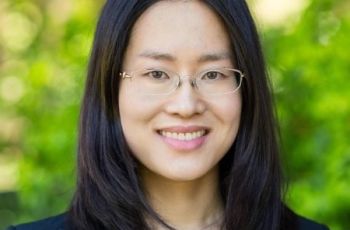Sara Richman found her calling early, volunteering on a crisis hotline as a teen. Now an oncology social worker, she’s still driven by the same instinct: to connect, to listen, and to help. When she’s not supporting patients, you’ll probably find her at a concert. She’s been hooked on live music since her very first show: Tina Turner at age six.

What’s your story?
I grew up in Cherry Hill, New Jersey, just outside of Philadelphia. My parents both worked in social services, so that was a mindset I was immersed in from a young age. In high school, I volunteered for a crisis hotline. It was intense at times. Some people called in real distress, and others just wanted someone to listen. That experience showed me how powerful human connection can be. It was my first real glimpse into mental health work, and I knew I wanted to keep going down that path.
I studied psychology in college and interned in a pediatric inpatient psych unit at Johns Hopkins. The patients ranged from very young children to older teens, and I worked with both the kids and their families. I sat in on rounds, did some play therapy. It was hands-on and eye-opening. After college, I earned my Master’s in social work at Rutgers and did internships in a charter school and then in a private practice in Brooklyn. The private practice experience was broad and deep. I worked with clients aged 8 to 65, dealt with all kinds of trauma, and used everything from play therapy to motivational interviewing.
When I finished grad school, my parents decided to move to Virginia and gave me a choice: stay in New Jersey and figure things out on my own, or move with them. The job market in New Jersey wasn’t great, and since I was just starting out, I didn’t have much money. So, I came down with them and started a new chapter here in DC.
What gets you out of bed in the morning?
It’s always the people. I love getting to know my patients, hearing their stories, and just being a steady presence for them. Cancer is not a journey anyone chooses, but I feel privileged to walk alongside people as they navigate it. Whether someone needs help figuring out their next appointment or just needs to vent, I want to be that person they can reach out to. I always tell people, “If you’re not sure who to call, call me.” I may not have the answer right away, but I’ll help you find it.
This work can be really hard, emotionally, but knowing I’m making a difference — even in a small way — is what keeps me going. Sometimes it’s the simplest things that matter most: returning a phone call, helping someone access a resource, just listening.
What is the one book that has influenced you the most?
The Body Keeps the Score by Bessel van der Kolk. It’s all about how trauma affects the brain: emotionally and physically. It breaks down the science in a really readable way, and it uses real patient stories to make the material come alive. Van der Kolk helped shape the PTSD diagnosis as we know it, and his work opened my eyes to how trauma can change someone’s perception of the world. One of the biggest takeaways is that trauma survivors aren’t “broken” or “crazy.” Their brains are doing what they need to do to survive.
I recommend it all the time to patients dealing with past trauma. It helps validate their experiences and often helps them understand themselves a little better. It also reminds me how different each person’s healing process can be, and that there’s no one-size-fits-all approach.
You and your work have made a difference for many patients. Is there one patient who made a difference for you?
There are so many, but one of the first patients I worked with at Washington Hospital Center really stands out. She was dealing with a cancer diagnosis and also facing major challenges like housing insecurity and family estrangement. Over time, she reconnected with her mother and eventually moved back in with her. She loved cheetah print and it dominated her wardrobe! I still think of her every time I see that pattern. After she passed away, her mother called me to say thank you and even organized a donation to the cancer center in her daughter’s memory. That really stayed with me.
There’s also a woman I’ve been working with here at GW for years. She has Stage 4 metastatic breast cancer and is absolutely thriving. She’s smart, resilient, and full of life. We recently helped her get her student loans fully forgiven, and she sent me flowers afterward. I saw her at an event a few months ago, looking amazing. She inspires me every time we talk.
What’s the most interesting thing we should know about you?
I’m a huge fan of live music. My first concert was Tina Turner and Cyndi Lauper when I was six years old — my parents took me — and I’ve been hooked ever since. I used to keep a list of every artist I’d seen in concert, but it got too long to manage. These days, I go to everything from arena shows to small club gigs. I’m the person who sticks around after the show and hangs out by the tour buses, just to see if I can spot someone from the band.

I went to the Eras Tour in Pittsburgh with my friend (and colleague, Jessica Gelfarb), and yes, we dressed up. I’m always up for a road trip to see someone play. Earlier this year, I saw Halsey, and I have a few more shows lined up for the rest of the year. A couple of years ago, my sister and I saw Mandy Moore at the 9:30 Club and stood right up at the front. There’s something magical about live music — being there in the moment, feeling the energy in the room. If it’s live and it’s music, I’m there.


